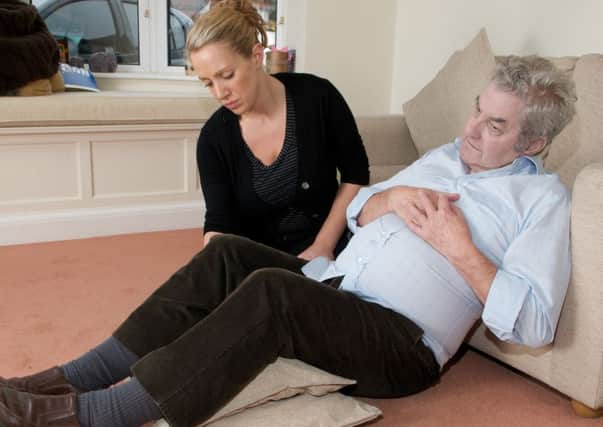ST JOHN AMBULANCE: Spot the signs of a heart attack
This article contains affiliate links. We may earn a small commission on items purchased through this article, but that does not affect our editorial judgement.


In the UK, 92,000 people suffer heart attacks each year – a third of them die as a result – and research from St John Ambulance also shows that almost two-thirds (61 per cent) of people wrongly believe that a heart attack is a cardiac arrest.
Worryingly, an incredible 40 per cent of people would not know what to do if faced with a middle-aged man with chest pains, whilst one in ten would put him in the recovery position, while waiting for an ambulance, which would not relieve the strain on the heart and may aggravate the condition.
Advertisement
Hide AdAdvertisement
Hide AdA heart attack is most commonly caused by a sudden blockage of the blood supply to the heart muscle itself, for example a blood clot.
The main risk is that the heart will stop beating.
Spotting the symptoms:
• Persistent central chest pain – often described as vice-like or a heavy crushing pain.
• Pain spreading to the jaw, neck and down one or both arms.
• Breathlessness.
• Discomfort in the high abdomen, similar to indigestion.
• Possible collapse without warning.
• Ashen skin and blueness at the lips.
• Rapid, weak pulse which may be irregular.
• Profuse sweating, skin cold to the touch.
• Gasping for air.
• Nausea and/or vomiting.
What to do:
• Sit the casualty in a semi-recumbent position with the knees bent.
Advertisement
Hide AdAdvertisement
Hide Ad• Call 999/112 for emergency help and tell ambulance control you suspect a heart attack.
• If available, and the casualty is not allergic, give them a 300mg aspirin tablet to chew slowly (provided they are not under the age of 16).
• If they have any medication for angina, such as tablets or a spray, assist them to take it.
• Constantly monitor and record breathing and pulse rate until help arrives.
Advertisement
Hide AdAdvertisement
Hide AdFor those looking for quick, easily accessible first aid information, the St John Ambulance app is available free on smartphones and the website (www.sja.org.uk) offers demo videos, an interactive game, and lots of free advice.
For more information about first aid courses please call 0303 003 0101.
• For those looking for quick, easily accessible first aid information, the St John Ambulance app is available free on smartphones and the website (www.sja.org.uk) offers demo videos, an interactive game, and lots of free advice. For more information about first aid courses please call 0303 003 0101.
Don’t miss out on all the latest breaking news where you live.
Advertisement
Hide AdAdvertisement
Hide AdHere are four ways you can be sure you’ll be amongst the first to know what’s going on.
1) Make our website your homepage at www.littlehamptongazette.co.uk/
2) Like our Facebook page at www.facebook.com/LittlehamptonGazette
3) Follow us on Twitter @LhamptonGazette
4) Register with us by clicking on ‘sign in’ (top right corner). You can then receive our daily newsletter AND add your point of view to stories that you read here.
And do share with your family and friends - so they don’t miss out!
The Littlehampton Gazette - always the first with your local news.
Be part of it.